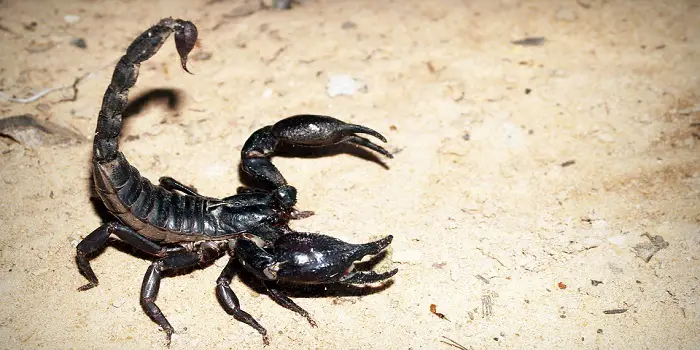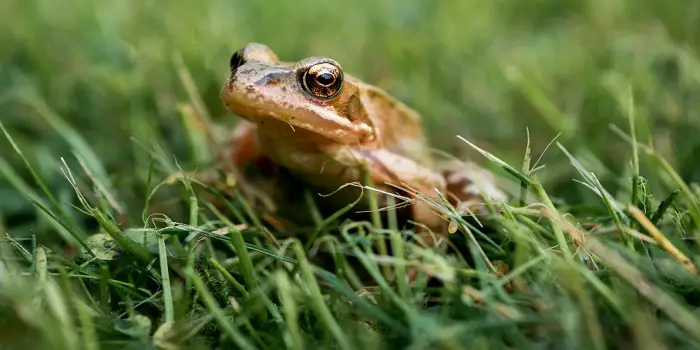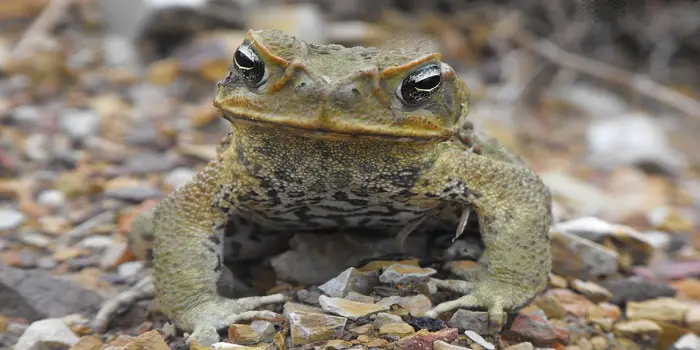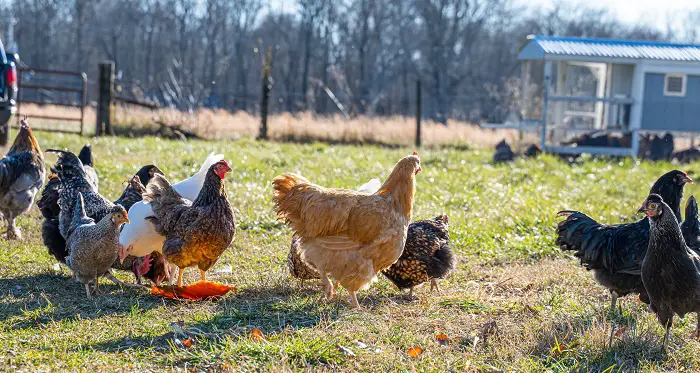
Chickens in the coop serve as easy prey for the predators due to their meek and passive nature.
Chickens dying out of disease or infection are a different one, but premature deaths due to animal attacks is a sad story.
You would have heard a number of stories where people describe they lost their chickens from their flock due to a predator’s attack.
If you are wondering what is killing your chickens at night, there can be many of them.
Below I have listed down the complete list/chart along with the most common predators that may eat your chickens, their nature, and their way of attacking.
Later in the guide, I will also discuss the ways employing which you can keep these predators out of your chicken coop.
Hopefully, this will let you be prepared to guard your cute chicks against their claws, jaws, or teeth of death.
Chicken Predators Chart
| Birds of Prey: (Aerial predators) | • Owl • Crow • Hawk • Eagle |
| Large Predators: (Land predators) | • Dog • Coyote • Bear • Wolf • Sasquatch • Mountain Lion |
| Smaller Predators: (Land predators) | • Cat • Rat • Fox • Skunk • Snake • Feral pig • Mink • Bobcat • Weasel • Opossum • Raccoon |
Common Predators of Chickens
Depending on the area you reside in, you may encounter sightings or attacks of various predators.
Some of the most common ones include:
1. Foxes
Definitely, many would have heard the age-old idiom “Fox in the hen house.”
Such is the popularity foxes have gained as superior predators.
Once the fox enters the coop, it makes sure to make the killing of chickens neat and clean.
Foxes venture in by digging holes at the bottom or by climbing.
Before launching an attack, they usually survey the chicken area for a few days at least.
And once they have tasted their favorite meal, foxes keep coming back for more to satisfy their insatiable desire and hunger.
It hunts both young and adult ones and, in fact, carries eggs to a safe place where they will munch on their feast.
Scattered feathers and blood drops on the ground serve as a signal of the fox’s attack.
2. Coyotes
Coyotes are cunning and clever in nature, and they don’t act stupid as they show in “The Road Runner Show” cartoon.
They are not a fan of climbing over the top to reach or attack the chickens; instead, they form a burrow.
This is an important clue for you, as the way they gained an entrance into the chicken coup differentiates who is the villain, whether it is the coyote or the fox.
Similar to the foxes, they will also eat the chicken completely, leaving no trace behind.
Mostly they hunt at night times in packs. But they are afraid of human presence.
So mostly, your shouting and chasing action will make them flee away from the crime scene.
3. Raccoons
Raccoons pose a greater threat to your chickens’ life.
They are not only skilled in climbing and digging holes but also clever enough to open the gates with the help of their finger-like claws.
With their finger-like claws, they easily snatch eggs laid on nests and even small chicks.
Only if the raccoons are very hungry, they attack a grown chicken and that too eat a portion of it, till they are full.
They drag their victim not so long from the coop, and you can see carcasses, broken necks, or scattered feathers around.
So, it’s better to put a lock on your gates.
4. Opossums
Like Raccoons, the opossums are the only marsupials that are after eggs, and small chicks predominantly and sometimes attack chickens.
They attack by biting the neck and belly of the chicken, making them incapacitate.
They won’t eat a whole chicken, so you can easily identify the leftover broken necks, blood stains, withered feathers, etc., as a sign of their attack.
Opossums usually enter by climbing or through small gaps in the gates or fencing.
5. Bears
Bears, being the biggest and most vital of all the predators on this list, also attack the chicken coop violently and break them to take away the chickens and eggs.
Actually, they don’t come after chickens directly, but you may ponder then what attracts them to the coop.
It’s the protein-rich chicken feed they are fond of and will never hesitate to eat chickens and eggs that come on their radar.
The best way to avoid them is to keep the garbage bins free of their favorite foods like chicken feed etc.
Paw-prints and broken pieces of coop etc., are clear signs of a bear attack.
6. Rats
Rats, being the smallest in size, you would wonder in the first place whether they qualify as a predator.
Yes, they are a nightmare for the small chicks, not the grown ones.
They steal eggs too to eat them at night.
Entering the coop is not a big deal for the rats, and even a small hole will suffice.
So, you will need to be pretty cautious about them.
7. Hawks
Hawks are one of the finest aerial predators, and they are skilled in zeroing in on the target of chickens, which do not look over the sky to be aware of any attacks.
When the chicks are left out in the morning, Hawks, with their strong beak and talons, grab the prey.
They slice it up with precision, leaving just a few seconds for the chickens to react.
Remember, you cannot shoot the hawks as it is not allowed in most states.
8. Owls
Well, you can say that Owls own the night and their sharp eyesight in dark conditions are their added advantage.
Rarely do they leave any trace as they snatch the chickens while gliding gently and take them away to its nest and feast on them.
Of all the owls, Great Horned Owls like to hunt down the chickens.
The killing of owls is also prohibited like hawks. So, it’s wise to keep the chickens inside the coop.
9. Dogs
Dogs, unlike other predators, hunt chickens as a sport and not for food.
They are playful and chase them, sometimes biting the chicken’s neck and keeping on shaking it vigorously till they are dead.
Whether your own dog or a stray, it’s better to keep them at bay for the good of your chickens.
10. Cats
Cats, no matter how much trained and a pet for you, their killer instincts will always be there.
Big roosters and adult hens are not a target for them due to their size and ability to fly some distance away in an attack.
Cats, especially the stray ones, directly go for the neck of the small chicks, and biting with their sharp teeth means doomsday for those small chicks.
So, it’s wise for you to always keep an eye on your pets as well as stray cats.
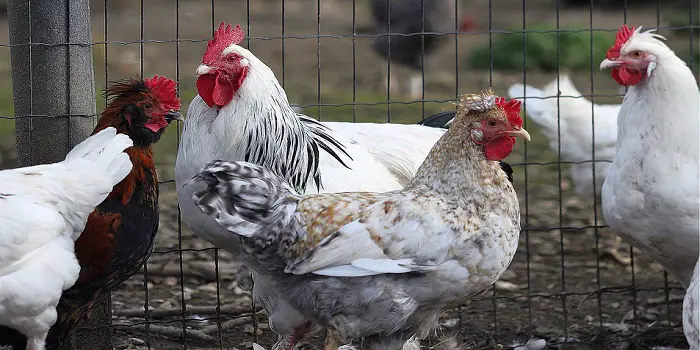
How to Keep Digging Predators Out of The Chicken Coop?
Being a proud owner of your cute little chickens, you might think that you have given them much-needed safety after putting them in the chicken coop.
But it’s not the end; there are still risks involved in the form of predators, which still lurk around seeking an entry into your coop by digging holes or burrows.
So, let’s look at the ways of keeping them at bay.
To be honest, it is more of a game of probabilities; the higher you follow the below steps, the more successful you will be.
1- Know Clear, No Fear
The first thing to do is clean your property well and avoid throwing food waste in your garbage bins.
Digging predators cleverly look for their food in the bins first and will avoid coming near the coop.
If there is a water tank or tap or any compost pit, make sure they are in an enclosed area, as there are chances for the predators to roam around in search of water or hide near the pits.
Pluck your fruits and vegetables at regular intervals and make sure there are no bushes or densely grown small plants around 100 to 150 feet surrounding your chicken coop area.
These can serve as a perfect hideout for the predators before leaping forward to launch their attack.
The cleaning tasks mentioned above may look silly, but the effect of doing these will be monumental, as it never gives any instinct for the predators to venture into your property and your chicken coop.
2- Bury Chicken Wires or Mesh
If you are starting from scratch in constructing your chicken fence, don’t forget to bury the chicken wire down around 10 inches from the ground level.
This will deter the process of predators to some extent, and if it’s a chicken wire, they will finally succeed in breaking it too.
This is an extra caution as the chicken wires are used to keep the chickens inside.
To withhold the predators from entering the coop, install and bury the hardwire mesh as it’s sturdier and not easy to break in.
In case you have already fitted those mesh or wires and failed to bury them deep, you have to pull it out and reinstall it.
3- Say No to Holes
Make it a habit to inspect your chicken coop and fences daily.
This will help you detect any holes or gaps or any damages to the coop or fence.
Even a small hole will become a loophole for the predators to come in and feast on your chickens.
As the saying “A stitch in time saves nine” goes, try to block any holes or gaps you come across, and it will save the lives of your beautiful chickens.
4- Use a Motion Sensor Light or Alarm
Installing motion sensor lights or alarms in your chicken coop will go on once they detect any movement beyond a particular territory.
It will scare the predators, forcing them to step back from their killing mission.
The only tricky issue that you have to address is it will go on even when it detects the motion of chickens, too, raising a false alarm.
So, fit them precisely at correct angles where it will recognize any movement of digging predators and not of the chickens.
As per the settings, you will get a text message or phone ringing whenever there is an encroachment inside your chicken coop.
Solar-powered devices can work at all times, and there are different sounds and colorful lights to choose from.
5- Dogs Come to the Rescue
A man’s best friend known for his loyalty, dogs, will prove their love and sense of belonging in safeguarding your chickens and other livestock too.
The only thing is when brought newly into the family of chickens, give them enough training, time, and space to get friendly with them.
Otherwise, this move will backfire, and they will become the predators.
They are good at barking, chasing, and scaring away predators. Make sure you choose the right breed of dog for your task.
6- Sonic Repellents
The sound produced from the sonic repellents gives a headache or nuisance to the digging predators, and they don’t think of coming near to it.
So, installing one in your chicken coop will be a great idea.
But do know that the same sound will give the same effect to your dogs, so they too will go away.
To avoid this awkward situation, make sure the volume turns on only when the predators approach near the coop, and you can set the perimeter line for this device activation.
7- Install Electric Fences
Of all the options available, this idea of using electric fences gives no chance for your predators to gain the upper hand in entering your chicken coop.
The larger the area, the larger will be the set-up cost involved. It’s worth the money and a fool-proof method.
Make sure it covers a decent height, too, as most predators are capable of jumping higher to cross the fence.
There is no animal cruelty involved as these shocks don’t kill them, but it’s sharp and makes them go dizzy for a few minutes, and they will twice again before approaching your coop.
8- Lock the Coop Whenever Necessary
Every animal by nature is talented in its own ways.
They use their brain to their fullest capacity every day as they have to fight for their own survival.
So, the predators will not simply go away from the scene once they have set their eyes on your chickens.
No matter whatever steps you take, if you forget to close and lock your chicken coop, all of your efforts will go in vain.
Digging predators are clever enough to open your simple locks and get inside, so make sure to use those locks which are hard for them to unlock.
Even if you are away for a few days, make sure to lock it and double-check before leaving for the safety of your chickens.
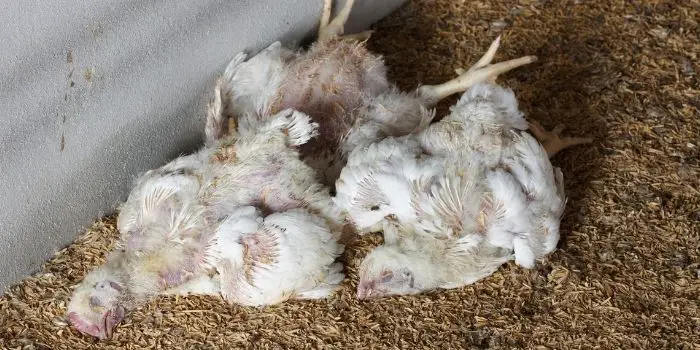
How To Tell What Killed My Chickens in the Coop? (Signs You Need to Know)
I know how unpleasant it feels – if you have lost a member of your flock.
Though you cannot bring your chicken back, knowing who’s the real culprit behind it can help you save the rest.
Fortunately, there are a few signs you can look for to know about the killer, such as:
- is your chicken’s side torn?
- is the head of the chicken decapitated from the body?
- is the chicken killed and left uneaten?
- are there feathers or eggs left behind?
- did the incident happen during the day or at night?
Answering these questions can help you know what had happened, the culprit behind the killing, how the animal killed the chicken, etc.
And this can ultimately help you prevent a second attack.
a) Missing eggs:
If you notice your small chick or eggs are gone, it could be a snake.
The missing eggs without any signs of death can be a human or a rat.
If you find the inside of the eggs gone and only the remains of cracked shells, this can be a skunk.
b) Missing head:
There are few animals that kill the chickens without eating them.
You can think of raccoon, hawk, owl, or eagle if you find everything else except the head of the chicken.
If there are guts scattered all over, it’s most likely the job of killers like an opossum or a weasel.
c) Feathers left:
Animals like a fox, coyote, feral pig, bear, tiger, and wolf will kill the chicken to take them away but leave the feathers behind.
Besides the above signs, it’s good to know that most predators who are after the eggs will generally attack during the day.
But the killers who want to eat the chicks will usually wait for the night.
Also, if you find that your chicken is unharmed but turned blue or has died, it’s most likely due to health issues and not the predators.
The Conclusion
Raising your chickens in a backyard coop is not an easy job – given the frequent attacks of predators on them.
Hopefully, this write-up has thrown some light on you to be cautious by knowing what animals or birds are taking your chickens away.
While the attacks of various predators cannot be completely avoided, at least you can be prepared and take the appropriate action when you smell the danger near your chickens.
Share the post "10 Predators That Can Eat Your Chickens – How to Keep Them Out?"

Welcome to ProShieldPest.com. I am Tina Jones. I have been working as a pest removal professional in Winslow, Arizona lately. At present, I love to spend my time with my family as a retiree.
Here I share all my knowledge and experiences to help people understand better how they can stop pests at their homes without actually killing them. Hopefully, the information you will find here will help in safeguarding your home! You can check more about me here.

